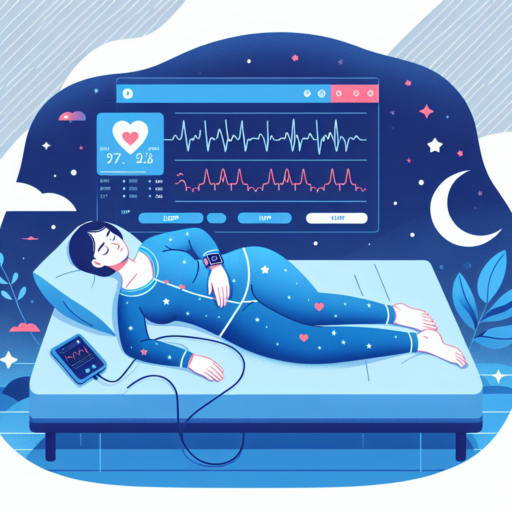Understanding the Importance of Deep Sleep for Adults
Deep sleep, also recognized as slow-wave sleep, is a critical stage of sleep that is especially beneficial for adult health and well-being. During deep sleep, our bodies are in their most restorative state, allowing for physical recovery, memory consolidation, and hormone regulation. Understanding the significance of deep sleep can be a key factor in improving overall quality of life for adults.
One of the primary benefits of deep sleep is its role in physical health maintenance. This phase of sleep is crucial for the repair of the body, including muscle growth, tissue repair, and the strengthening of the immune system. It’s during this time that the growth hormone is released, facilitating these vital processes. Consequently, lacking deep sleep can not just leave one feeling tired, but also vulnerable to health issues.
In addition to physical health, deep sleep significantly impacts mental health and cognitive function. It plays a central role in memory consolidation—the process of converting short-term memories into long-term ones. Furthermore, it’s during deep sleep that our brains purge unnecessary information, which helps in improving mental clarity and concentration. Without sufficient deep sleep, one’s ability to learn, retain information, and make decisions could be impaired, highlighting the importance of this sleep phase for adult cognitive resilience.
How Much Deep Sleep Do Adults Really Need?
Understanding the amount of deep sleep adults require is crucial for promoting overall health and well-being. Deep sleep, or slow-wave sleep, plays a fundamental role in memory consolidation, physical recovery, and hormonal regulation. While individual needs can vary, most adults need to aim for a specific range of deep sleep each night to function at their best.
Experts generally agree that adults should strive for about 20-25% of their total sleep time to be comprised of deep sleep. Given that the average adult needs about 7 to 9 hours of sleep per night, this translates to roughly 1.4 to 2.25 hours of deep sleep. Achieving adequate deep sleep is essential for one’s physical and mental health, influencing everything from mood regulation to immune system performance.
Identifying Adequate Deep Sleep
Recognizing whether you’re getting enough deep sleep involves paying attention to how you feel during the day. Symptoms of insufficient deep sleep include difficulty concentrating, feeling fatigued despite a full night’s sleep, and heightened emotional reactivity. Tools such as sleep trackers can offer insights into your sleep patterns, but it’s also important to listen to your body’s signals.
The Science Behind Deep Sleep: What Happens to Your Body?
Understanding the science behind deep sleep illuminates how critical this phase is for rejuvenation and health. During deep sleep, also referred to as slow-wave sleep, your body undergoes significant repair and restoration processes. It’s a time when the brain consolidates memories, the release of growth hormones peaks, and overall, the body gets the rest it crucially needs to function optimally.
Cellular Repair and Growth Hormone Release
One of the most vital roles of deep sleep is facilitating cellular repair and regeneration. This phase prompts an increase in the release of growth hormone, which accelerates tissue growth and muscle repair. It’s a pivotal time for your body to heal and renew itself, highlighting the importance of attaining sufficient deep sleep for athletes and individuals in recovery.
Brain Detoxification and Memory Consolidation
Beyond physical restoration, deep sleep plays a fundamental role in brain health. During this stage, the brain effectively «cleans house,» removing toxins that accumulate during waking hours. This process, critical for preventing neurodegenerative diseases, also aids in memory consolidation. It’s during deep sleep that the brain sorts and stores memories, converting short-term recollections into long-term knowledge, a process essential for learning and cognitive function.
Moreover, the impact of deep sleep extends to emotional regulation and stress reduction. A lack of deep sleep has been linked to increased sensitivity to stress, anxiety, and mood fluctuations. Thus, achieving adequate deep periods of sleep is integral not just for physical health but for mental well-being too.
Comparing Average Deep Sleep Recommendations: Expert Insights
When it comes to achieving optimal health and well-being, understanding the importance of deep sleep is essential. Experts in sleep science have conducted various studies to determine the optimal amount of deep sleep individuals should aim for each night. However, these recommendations can vary, making it essential to compare and analyze expert insights to find a guideline that may best suit individual needs.
Deep sleep, characterized by its slow-wave activity, plays a crucial role in physical recovery, memory consolidation, and maintaining a healthy immune system. The American Academy of Sleep Medicine suggests that adults should aim for 7 to 8 hours of sleep per night, with deep sleep constituting approximately 13-23% of sleep duration. This translates to roughly 55 to 110 minutes of deep sleep each night. However, factors like age, lifestyle, and overall health can influence these numbers significantly.
To further understand these variations, it’s important to consider insights from various sleep studies and experts. For instance, the National Sleep Foundation highlights that as we age, the amount of deep sleep we achieve naturally decreases. This suggests that younger populations may need to prioritize obtaining a higher percentage of deep sleep than older adults. Contrastingly, athletes or individuals with physically demanding lifestyles might require more deep sleep for optimal recovery and performance.
Factors That Influence Your Deep Sleep Duration
Several variables can affect how long you spend in deep sleep each night, a crucial phase for physical and mental restoration. Understanding these factors can help you optimize your sleep quality, ensuring you get enough deep sleep to support your body’s needs.
Age
One of the most significant influences on your deep sleep duration is age. Younger individuals typically experience longer periods of deep sleep, which naturally declines as you grow older. This change is part of the normal aging process, but it highlights the importance of maximizing sleep quality at any age.
Lifestyle Habits
Lifestyle choices also play a critical role in determining the quality of your deep sleep. Factors such as diet, exercise, and stress levels can all impact your ability to reach and maintain deep sleep. For instance, regular physical activity has been shown to improve the quality of sleep, while high levels of stress and consumption of caffeine before bedtime can decrease the duration of deep sleep.
Sleep Environment
The environment in which you sleep can greatly influence your deep sleep duration. Elements such as light, noise, and temperature should be optimized to create a conducive sleep environment. A dark, quiet, and cool bedroom is often considered ideal for fostering deep, uninterrupted sleep cycles.
Top 5 Ways to Increase Your Deep Sleep Naturally
Sure, focusing on creating content that’s SEO optimized for your H2 heading, here’s a version that could potentially enhance user engagement and search engine visibility.
Deep sleep, also known as slow-wave sleep, plays a crucial role in your body’s health and well-being. Enhancing the quality of your deep sleep naturally can lead to improved mental clarity, rejuvenated energy levels, and a stronger immune system. If you struggle to feel rested upon waking, consider these top 5 natural strategies to increase your deep sleep.
Establish a Routine Sleep Schedule
Consistency is key when it comes to improving your sleep quality. Going to bed and waking up at the same time every day, including weekends, helps regulate your body’s internal clock. This predictability makes it easier to fall asleep and enter deep sleep cycles.
Optimize Your Sleep Environment
Your bedroom environment significantly affects your ability to fall and stay asleep. Ensure your sleeping area is cool, quiet, and dark. Investing in a comfortable mattress and pillows, as well as using blackout curtains, can greatly enhance the depth and quality of your sleep. Minimizing exposure to electronic devices before bed is also vital, as the blue light emitted can disrupt your natural sleep cycle.
Practice Mindfulness and Relaxation Techniques
- Meditation: Engaging in mindfulness or meditation before bedtime can calm the mind and prepare your body for deep sleep.
- Deep Breathing Exercises: Simple deep breathing techniques can help lower your heart rate and promote relaxation, making it easier to drift into deep sleep.
- Progressive Muscle Relaxation: Progressively tensing and then relaxing different muscle groups can reduce physical stress and facilitate deeper sleep.
Integrating these natural strategies into your nightly routine can significantly increase the quality of your deep sleep, leaving you feeling more rested and revitalized each day. Remember, consistency is key, and small changes can make a big difference.
Tools and Technologies to Monitor Your Deep Sleep
Understanding the quality of your deep sleep is crucial for overall health and well-being. With the advancement in technology, various tools and technologies have been developed to provide insightful data about your sleeping patterns. These tools are designed to help you enhance your sleep quality by tracking and analyzing your deep sleep stages. In today’s fast-paced world, ensuring that your body gets the restorative sleep it needs can make a significant difference in your energy levels, mood, and cognitive functions.
Wearable Sleep Trackers
One of the most popular methods for monitoring deep sleep involves the use of wearable sleep trackers. These devices, often worn on the wrist or as part of your bedding, use sensors to track your body movements and physiological signals such as heart rate and breathing patterns. Brands like Fitbit, Garmin, and Apple Watch have integrated sophisticated algorithms that analyze this data to provide a detailed view of your sleep stages, including deep sleep, light sleep, and REM cycles. By understanding these patterns, users can make informed adjustments to their sleep habits.
Smart Mattresses and Bed Monitors
Another innovative approach to monitoring deep sleep is through smart mattresses and bed monitors. These high-tech solutions come equipped with sensors that measure pressure, temperature, and movement throughout the night. Companies like Eight Sleep and Beddit offer sleep systems that not only track your sleep efficiency but also provide personalized recommendations to improve sleep quality. The data collected by these devices can often be accessed via a smartphone app, making it easy to review and interpret your sleep trends over time. This level of detailed monitoring allows for a comprehensive understanding of how different factors, such as room temperature and sleeping posture, affect your deep sleep.
Sleep Apps
In addition to hardware-based tools, there are numerous apps available that can help monitor and analyze your deep sleep. Sleep Cycle, SleepScore, and Calm are examples of apps that use the microphone and accelerometer in your smartphone to detect movements and sounds during the sleep. These apps offer valuable insights into your sleep patterns, providing you with feedback and tips on how to get better rest. With the convenience of not requiring any extra devices, sleep apps have become a favourite option for many looking to gain more control over their sleep quality.
Addressing Common Deep Sleep Myths and Facts
In the world of sleep science, understanding what contributes to a good night’s rest is paramount. However, the landscape is riddled with misconceptions that often mislead people about the nature of deep sleep. Let’s demystify some of these common myths and clarify the facts to help you better understand what truly influences your slumber.
Myth: More Sleep Equals Deeper Sleep
One widespread belief is that the more hours you spend asleep, the deeper your sleep will be. However, quality over quantity is what truly matters. Deep sleep, also known as slow-wave sleep, is crucial for physical restoration and memory consolidation, but it doesn’t necessarily increase with longer sleep durations. The architecture of your sleep, including the cycles of deep and REM sleep, is more critical than the total number of hours slept.
Fact: Lifestyle Choices Impact Deep Sleep
It’s not all myths in the realm of deep sleep; some truths are universally acknowledged. For instance, your lifestyle choices—like diet, exercise, and stress management—have a significant influence on your sleep quality. Engaging in regular physical activity and maintaining a balanced diet can promote better deep sleep cycles. Conversely, excessive stress and consumption of stimulants close to bedtime can severely disrupt the quality of your sleep, impeding your ability to enter deep sleep stages.
How Certain Health Conditions Affect Deep Sleep in Adults
Deep sleep plays a crucial role in overall well-being, aiding in the repair and recovery of the body and mind. However, several health conditions can significantly impair the quality of deep sleep in adults, leading to a range of adverse effects on health.
Impact of Sleep Apnea on Deep Sleep
Sleep apnea, a disorder characterized by interrupted breathing patterns during sleep, is one of the foremost enemies of deep sleep. The frequent awakenings caused by sleep apnea prevent sufferers from sustaining the deep, restorative stages of sleep. Adults with untreated sleep apnea may experience reduced sleep efficiency, leading to daytime fatigue and impaired cognitive functions.
Chronic Pain and Sleep Disturbance
Chronic pain conditions, such as fibromyalgia and arthritis, present another significant barrier to deep sleep. Adults dealing with chronic pain often find it challenging to achieve and maintain a state of deep sleep due to the persistent discomfort. The lack of deep sleep can contribute to a vicious cycle, where inadequate rest exacerbates pain sensitivity, further impairing sleep quality.
The relationship between health conditions and deep sleep is complex, with numerous factors interplaying to determine sleep quality. By understanding how specific health issues impact deep sleep, adults can seek appropriate treatments and interventions to improve their sleep and, by extension, their overall health.
Improving Your Deep Sleep: Strategies to Try Tonight
Improving the quality of your deep sleep is crucial for your overall health and well-being. Deep sleep, the stage of sleep also known as slow-wave sleep, is essential for memory consolidation, muscle repair, and the rejuvenation of your immune system. If you’re struggling to get enough deep sleep, there are several strategies you can implement tonight to promote better sleep quality. From optimizing your sleep environment to adjusting your pre-sleep routine, let’s explore some practical steps you can take.
Optimize Your Bedroom Environment
Your bedroom environment plays a pivotal role in how well you sleep. Ensuring your bedroom is dark, quiet, and cool can significantly influence the quality of your deep sleep. You might consider using blackout curtains to block out any external light and a white noise machine to drown out distractions. Additionally, keeping your room at a temperature between 60-67 degrees Fahrenheit (15.6-19.4 degrees Celsius) is ideal for promoting deep sleep.
Create a Pre-Sleep Routine
A consistent pre-sleep routine signals to your body that it’s time to wind down and prepare for deep sleep. This routine might include activities such as reading a book, taking a warm bath, or practicing relaxation exercises. Avoiding screens and devices at least an hour before sleep is also crucial, as the blue light emitted can interfere with your body’s natural sleep-wake cycle. Integrating these practices into your nightly routine can help ease the transition to sleep, making deep sleep more attainable.










